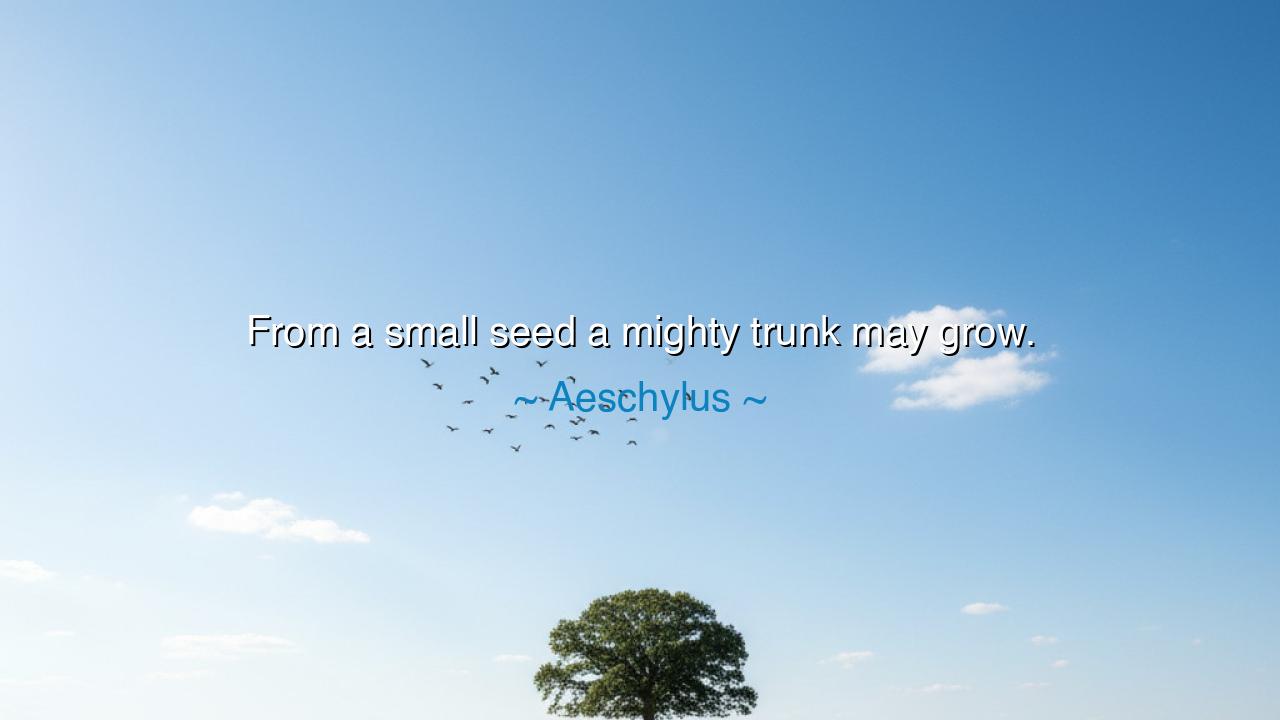
From a small seed a mighty trunk may grow.






“From a small seed a mighty trunk may grow.”
Thus wrote Aeschylus, the father of Greek tragedy, the poet who taught that suffering and endurance are the roots of wisdom. In this ancient truth, he reveals the mystery of growth, potential, and becoming — that greatness is not born in an instant, nor from vast beginnings, but from the humblest of origins. The small seed, fragile and hidden beneath the earth, carries within it the essence of a towering trunk — strength, majesty, and endurance. In these few words, Aeschylus reminds us that even the greatest powers, nations, and souls begin in silence and obscurity, nourished by faith, patience, and time.
Aeschylus lived in the fifth century before Christ, a warrior and a thinker who had seen the glory and agony of Greece. He fought in the Battle of Marathon, where a handful of Greeks repelled the vast Persian host. He witnessed with his own eyes how courage — though small in number — could stand against the might of empires. From such moments, he understood that the seed of greatness often lies not in strength, but in spirit. When he wrote that from a small seed a mighty trunk may grow, he spoke both of life and destiny — that all things noble arise from beginnings that seem too weak to survive.
This wisdom can be seen written into the very fabric of the world. The oak, king of the forest, begins as an acorn scarcely larger than a fingernail. Yet given soil, light, and seasons, it rises into a tree that can weather a century of storms. So too with the human spirit: the dream, the virtue, the vision — all begin as tiny sparks of intent buried within the heart. But through perseverance and faith, they unfold into works that outlast the flesh. The ancients knew this truth well; they saw it in the cycles of nature and in the rise of civilizations. Growth is divine patience made visible — the slow unfolding of eternity within time.
Consider the story of Helen Keller, who was born into silence and darkness, unable to hear or see. Her condition seemed a prison without escape, her mind a seed trapped in stone. Yet through the gentle hand of her teacher, Anne Sullivan, the seed began to stir. One day, as cool water poured over her hand and the word “water” was spelled into her palm, understanding bloomed — a single spark of consciousness that grew into a lifetime of brilliance. From that moment of awakening — so small, so fragile — a mighty trunk rose. Keller became a writer, an activist, a symbol of human possibility. Her life itself is the living parable of Aeschylus’s wisdom: that from what seems powerless can rise the power to inspire the world.
This law of growth governs not only lives, but history itself. The founders of nations, the birth of revolutions, the dawning of faiths — all begin as whispers, not thunder. The teachings of the Buddha began with one man beneath a tree. Christianity began with a single voice crying out in Galilee. Even the ideas that have shaped science and liberty were once dismissed as trivial. Yet in time, they grew roots deep and wide, breaking through stone, transforming the face of the earth. For it is not the size of the beginning that determines its destiny, but the fertility of the soul that sustains it.
The lesson, then, is both humbling and empowering: never despise small beginnings. Every noble act, every word of kindness, every moment of courage, is a seed planted in the soil of eternity. You may not see its trunk rise within your lifetime, but it will grow nonetheless, reaching toward heaven in its appointed time. The wise do not demand immediacy; they trust the laws of growth. As Aeschylus teaches, greatness is not given — it is grown, nourished by struggle and sanctified by endurance.
So, my child of dust and light, plant your seeds. Plant them in faith, in patience, and in love. Tend them even when the world mocks their smallness, for the oak itself once lay forgotten beneath the leaves. Your smallest act of goodness, your quiet persistence, your single dream — these are not small at all. They are the beginnings of might, the foundations of eternity. For as Aeschylus declared, and as the ages have proven true: “From a small seed a mighty trunk may grow.” Nurture your seed well, and the world itself shall one day rest in its shade.






AAdministratorAdministrator
Welcome, honored guests. Please leave a comment, we will respond soon